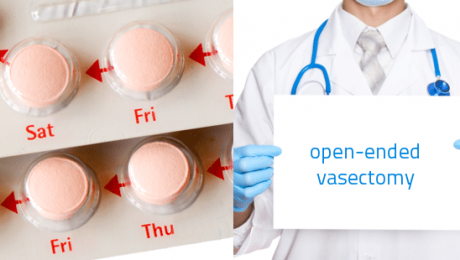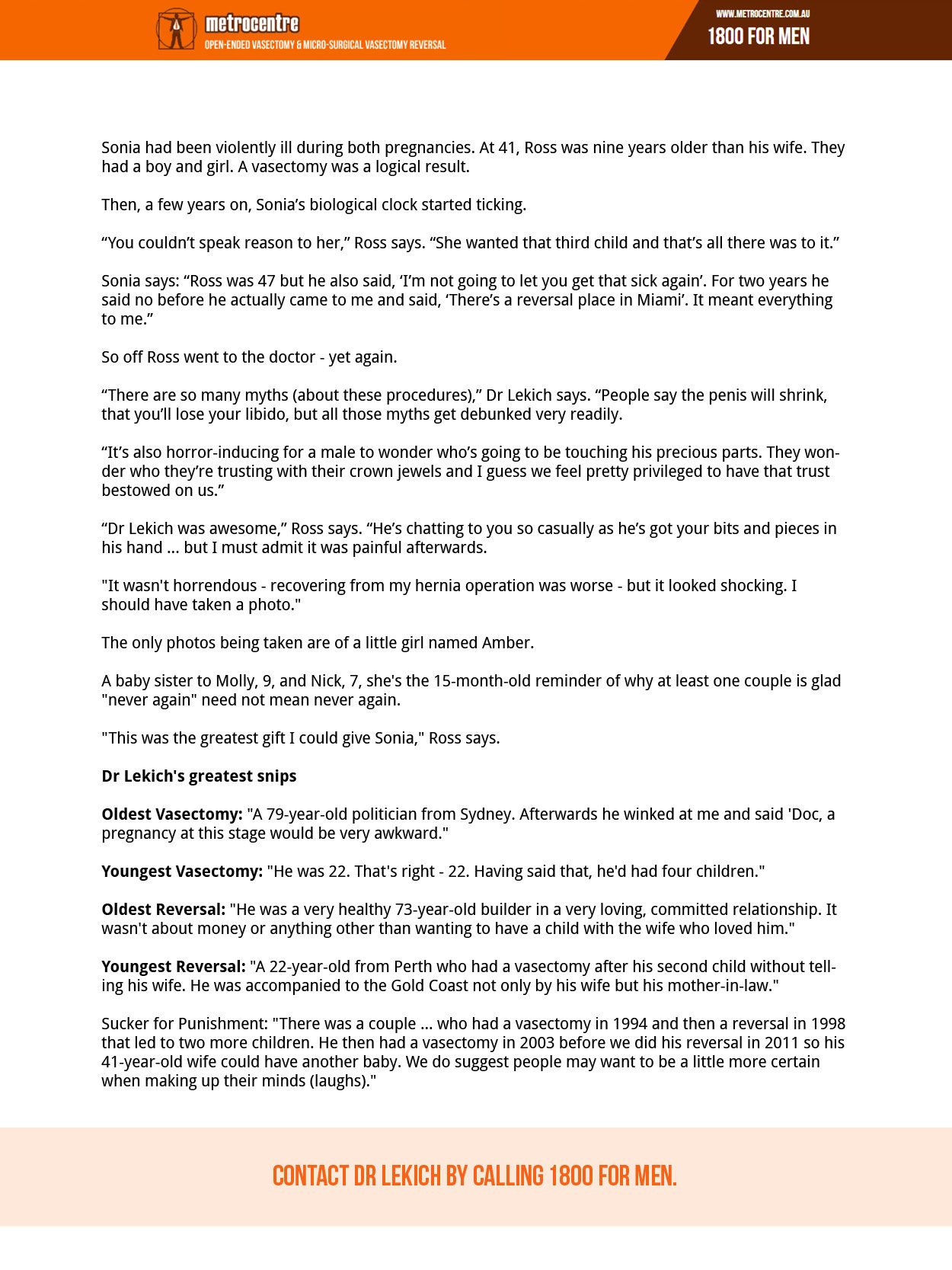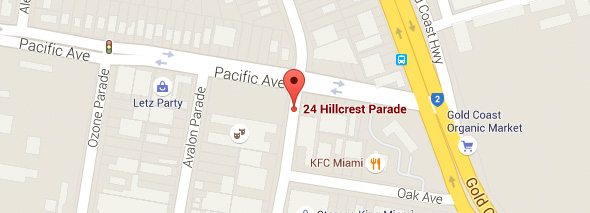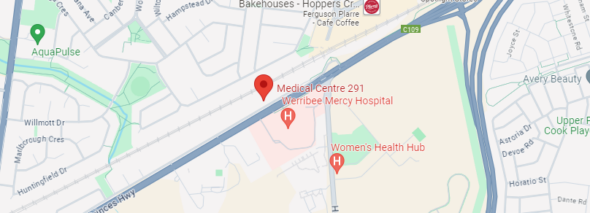Vasectomy Recovery
Considering a vasectomy takes time and research. It is an important decision to make and all aspects of the process, including vasectomy recovery, should be carefully understood before moving forward.
Dr Lekich encourages all patients researching a vasectomy to carefully consider who and where they will receive their treatment as not all vasectomy treatments are equal.
Your vas deferens tissue is precious and limited in length so should be treated with precision and care.
Recovery from vasectomy
After your vasectomy surgery, you will be numb in that area for approximately 1-2 hours due to the local anaesthetic. We recommend applying cold packs to the area and rest for the remainder of the day. You may prefer to wear tighter underwear for support.
Over the next few days, you may have minimal or no swelling or pain. Panadol or Pannadiene work well here. Keep away from anti-inflammatories – eg Nurofen for four (4) days after the procedure. We recommend taking at least 2 days off work to ensure a smooth recovery unless you have a desk job. After this time you may return to work, however, you must avoid heavy lifting and strenuous activity for a week post-surgery. You will be able to resume sexual activity as soon as you feel comfortable to do so – usually around a week after surgery.
Remember that you will need to use another method of contraception until your receive clearance from your doctor after having a sperm test three months after the procedure. We will give you a request form for this on the procedure day so you can do the test in your local area. You need to have around 20-30 ejaculations to enable a clear result. A semen analysis is the only way you know for sure whether the procedure has been successful. This is a crucial part of the vasectomy process and it is important that you get this test done and receive the result from us to ensure that there is no risk of unplanned pregnancy.
Your vasectomy will not affect your sex drive or ability to have erections, ejaculate or the sensation of orgasm. However, some patients have noted a mild and occasional aching in the testicles during sexual intercourse over the few months post-surgery. Should pain persist, Dr Lekich will review with an ultrasound scan on site.
Side effects of vasectomy
Many men considering vasectomy as a contraception option are concerned about the potential pain following the surgery. As discussed above, a mild level of discomfort is considered normal after the surgery and can be well managed by pain medication and ice packs. A small amount of light bleeding and swelling around the incision may occur and should subside within a few days.
Studies show that approximately 20% of men will experience chronic pain for 3 or more months following the procedure. Less than 1% of patients may experience a blood vessel bleed in the scrotum that may form a blood clot. This may need to be drained by a doctor. In very rare occasions the cut ends of the vas deferens may re-join and cause an unplanned pregnancy. These complications do not feature in our practice where an open-ended technique with the reconstruction of the vas deferens is performed as part of the Vasectomy.
- Published in Post Vasectomy Pain Syndrome, Vasectomy
Reports on Long-term Pill Use
If Long-term Pill Use is no longer appropriate, then consider an Open-Ended Vasectomy with Metrocentre.
There are certain situations when you’re not able to take the contraceptive pill, such as;
- Weight gain
- Pigmentation
- Nausea and vomiting
- Dizziness
- Headache or a migraine
- Depression
- High blood pressure
- Loss of libido
- Bone density loss
- Breast cancer
- Family history of breast cancer
- Varicose veins
- Past history of blood clots
- Family history of blood clots
- Stroke
- Blindness
- Liver tumours
- Heart disease
When you have fully explored your options and you decide on a vasectomy, carefully consider your procedure with Metrocentre. Our open-ended vasectomies are carefully considered by our microsurgical vasectomy reversals where a reconstruction performed without any destruction (reconstructing the two ends into separate compartments) to minimise post vasectomy pain and maximise the reversibility should this be required.
Very few doctors offer an open-ended vasectomy and when they do almost do not perform a reconstruction and instead cut out precious vas deferens plumbing to avoid two ends coming back together. For this reason, most of these doctors can perform a vasectomy quickly (about 15 min) and through a small central incision. Metrocentre open-ended vasectomy approach takes 30 minutes and two carefully placed small (3-4 mm) incisions for the extra work that is required rather than a quick snip.
Most general practitioners, urologists and surgeons perform the closed vasectomy which can lead to a sudden increase in pressure in the delicate tubules called the epididymis and in some cases there is an associated cascade of inflammation that causes scarring of these delicate tubules.
Why you should consider vasectomy as a solution to pregnancy risk
The pill is often regarded as the ideal contraceptive option, however, many women and men do not consider vasectomy as an option, especially as you get older. Vasectomy should be considered as an option as it is one of the most natural ways to stop unplanned pregnancies. This is because it does not require synthetic hormones of any kind, it requires a surgical procedure that should be performed by an experienced professional such as Dr Chris Lekich at Metrocentre.
Dr Lekich performs the open-ended vasectomy which involves disconnecting the vas deferens. The testicular end of the tube will be left ‘open’ and the other end will be separated by tissue in the scrotum. This way sperm continues to be produced and erupts out of the gas tube into the tissue, which will absorb this.
This procedure is extremely beneficial compared to a traditional vasectomy as it does not cause any build-up of sperm in the testicle and there is rarely a case of aching or post-vasectomy pain. This is because there is no added pressure on any part of the testicles or epididymal tubules.
Common questions about Vasectomy
Will I still be able to have an erection?
Yes. You will still be able to have an erection as the only physical alteration that is made during the open-ended vasectomy is where the sperm goes after orgasm, that is only interrupting plumbing.
Will sex feel the same?
All of the sensations during sexual intercourse should feel the same. No part of the penis is altered, only a small incision is made in the scrotum to alter the vas deferens.
It must be noted however that if you have a post-vasectomy congestion pain syndrome or a severe complication post vasectomy of haemorrhage or infection, that sex, marriages and work can be severely affected. Dr Lekich to his knowledge to date has not had one case of post-vasectomy congestion pain syndrome. Due to his expertise at scrotal ultrasound assessment and management of post-vasectomy pain syndrome, he sees patients from all over Australia and overseas where vasectomy has been performed resulting in complications, the occasional suicidal patients, where patients were not made aware of their options to have a refined type a vasectomy.
Will my testosterone be affected at all?
No, an open-ended vasectomy does not alter the production of testosterone at all.
If you have any further questions the team at Metrocentre welcomes your enquiry. We have convenient locations in Brisbane, Sydney, Melbourne and the Gold Coast and we frequently see patients from interstate or overseas. If you’ve been contemplating a vasectomy or if you want a better option for contraception please contact Dr Lekich.
- Published in Post Vasectomy Pain Syndrome, Vasectomy
Can Vasectomy influence Overpopulation?
Metrocentre’s Dr Chris Lekich was recently interview by David Sibenaler for the Royal Institution of Australia. The article focused on overpopulation and the role vasectomies could play in preventing the issue.
You can read the full article in power point format below.
Dr Chris Lekich is the successor of the highly skilled microsurgeon Professor Owen. He has also been mentored by Dr Errey and Dr Walters who were both pioneers of the vasectomy. Dr Chris Lekich believes that this delicate procedure should not be viewed as a ‘quick snip’ – this is why Dr Lekich (as directed by his mentors) invests thirty minutes of careful procedure time to ensure your vasectomy procedure is performed according to the highest standards.
Metrocentre also offers vasectomy reversals inspired by microsurgical techniques that require precision and skills that only Dr Chris Lekich can provide. This is why he receives many patients from Australia, New Zealand and even Dubai seeking his professional standard of vasectomy reversals and vasectomies.
Contact Metrocentre in Brisbane, Sydney, Melbourne or the Gold Coast by calling us on 1800 FOR MEN.
- Published in Post Vasectomy Pain Syndrome, Vasectomy
Metrocentre’s Vasectomy Reversal Procedure Creates another Family
Metrocentre was recently featured on goldcoast.com.au, after Dr Chris Lekich performed a vasectomy reversal – inspired by the microsurgical techniques of his mentors.
Ross and Sonia Deakin were one of many couples who changed their minds after undergoing a vasectomy procedure. Ross had already undergone a vasectomy when the couple decided that they once again wanted to have a child. In order to reverse his decision for no more children, he decided to see Dr Chris Lekich, who is renowned for his advanced vasectomy reversals inspired by microsurgery. This procedure is called the Owen 3 Layer Micro-surgical vasectomy reversal and was passed down by his primary mentor Professor Owen.
The procedure itself involves 3 layers of suture, to account for the three layers of the vas tube which includes the inner intima, the middle muscular and the outer advential layer. This procedure ensures maximum precision and a stronger bond between the two ends of the vas tube which will increase your chances of a successful vasectomy reversal.
Find out more about the owen 3 layer microsurgical vasectomy reversal procedure here.
You can also read Ross and Sonia Deakin’s journey by reading the article below:
Have you been through a similar change of mind and want a vasectomy reversal? Metrocentre has locations in Brisbane, Sydney, Melbourne and the Gold Coast for your convenience. If you’re out of state or from a different country we can also ensure that your stay with us will be comfortable and stress free.
- Published in Post Vasectomy Pain Syndrome, Vasectomy
Start a Conversation this World Vasectomy Day
By starting a conversation you can help bring awareness to a problem that is making worldwide issues such as global warming, poverty and war all the more complicated – Population.
For men who don’t want to have children, having a vasectomy is the best way that they can be responsible to themselves and their families. A vasectomy is one of the most efficient and safest forms of contraception currently available and it is a straight forward procedure that take 25-30 minutes when performed in a way to reconstruct the tissues so to avoid destruction.
In Australia over 30, 000 men undertake a vasectomy procedure every year and for most males it takes around three months for the sperm to be cleared from the tubes. World Vasectomy Day aims to give as many men as possible the opportunity to get a vasectomy by a trained professional and become a part of the solution to combat overpopulation and unexpected pregnancies.
On the 18th of October one hundred doctors in twenty five countries are going to perform vasectomies on over one thousand male patients. At Metrocentre we believe as one of the largest centres for vasectomy in Australia it is our duty to raise awareness about the vasectomy. However, we stress that this procedure should not be done as a quick snip, it requires thorough evaluation and a precise procedure to minimise complications such as inflammation and congestion of the epididymal tubules.
Unable to make it to World Vasectomy Day? Metrocentre welcomes new patient’s everyday…
Metrocentre is one of the largest centres for vasectomies in Australia and is on the forefront for advanced techniques in the field of open-ended vasectomies and vasectomy reversal procedures and have locations on the Gold Coast, Sydney, Brisbane and Melbourne. Dr Chris Lekich and his team of highly trained professionals, Professor Owen, Dr Stirling, Dr Bradshaw and Jennie are strong advocates for the Open-Ended Vasectomy procedure which has a lower post vasectomy congestion complication rate and is more successful to reverse if circumstances change. The open-ended vasectomy procedure performed by Dr Lekich is far superior to any quick snip vasectomies or traditional vasectomies.
Make World Vasectomy Day a topic for discussion any day by starting a conversation. Always consider your options when it comes to your life, your family and the 7.2 billion other people we share this wonderful world with.
To find out more information about Open-Ended Vasectomy procedures you can give Metrocentre a call on 1800 FOR MEN.
- Published in Post Vasectomy Pain Syndrome, Vasectomy
The Questions You Should Ask Yourself Before You Undertake a Vasectomy
When it comes to selecting an appropriate form of contraception, many men find a vasectomy procedure worth considering.
The selection of reliable contraception is a highly important decision for all sexually active males, and at Metrocentre we offer one of the most reliable and permanent forms of contraception: an open ended vasectomy procedure.
This minimally invasive procedure involves interrupting the vas deferens to prevent sperm from entering the ejaculate, effectively preventing potential pregnancies. It is important to note that this form of contraception does not protect against sexually transmitted diseases such as HIV and gonorrhea, and as such traditional barrier methods may also be recommended such as condoms to reduce the risk of the transmission of these diseases.
Whilst vasectomy procedures have historically been highly effective, as this is a permanent procedure it is important to consider this decision in great detail. The following questions have been designed to help men considering undertaking a vasectomy procedure make an informed and appropriate decision.
1) Am I being pressured by my partner or family members to undertake a vasectomy procedure?
Whilst this type of surgical procedure is minimally invasive, it is important to note that this should be considered a PERMANENT procedure. Due to this factor it is important that you are completely comfortable with this decision and are not doing it simply to please your partner or others in your life.
2) Is there any possibility that I will want to conceive a child later in life?
If you envision children in your future this type of procedure may not be a great choice for you. Regardless of the fact that there are highly successful vasectomy reversal procedures available (such as the Owen 3 Layer Micro-Surgical Vasectomy Reversal) there is still a chance that these measures may be unsuccessful, and as such if you desire children later in life a vasectomy procedure may not be the appropriate choice for you.
3) Why should I consider a vasectomy if my partner is taking the contraceptive pill?
There are many reasons why couples may wish to consider switching from the oral contraceptive pill to other methods such as a vasectomy procedure. Pregnancies can occur if the oral contraceptive pill is not taken on a regular basis as prescribed, and this form of contraception has also been linked in recent times to some serious health risks especially with long term use. Whilst more research is being conducted into the link between the oral contraceptive and health risks, at present a link has been found between the pill and serious health risks such as heart disease, venous disorders, and some cancers such as breast and cervical.
4) What are the benefits of a vasectomy procedure when compared to tubal ligation?
Compared to a tubal ligation procedure for female partners, a vasectomy procedure for males is far less invasive and far less expensive. Tubal ligation procedures are invasive and can be painful, with the potential side effects and complications associated with this surgical procedure and involve general anaesthetic.
What are the potential risks/side effects associated with vasectomy procedures?
As with all surgical procedures, there are published potential risks and complications associated with a vasectomy procedure. These can include bleeding, skin irritations, mild pain, post vasectomy chronic congestion pain, nerve related pain, scrotal haemorrhage (the team at Metrocentre find this far too common with patients who seek vasectomy procedures elsewhere), infection, a feeling that there is a slight reduction in the volume, taste or velocity of ejaculate.
It is important to note that these published potential risks and complications rates are overstated and do not feature at Metrocentre. Our procedures take longer to reconstruct rather than cause destruction to achieve sterility with our microsurgical reversal of vasectomies inspiring our vasectomy procedures.
What is the best type of vasectomy procedure for me?
At Metrocentre we recommend our open-ended vasectomy technique. This is associated with a decreased chance of the development of post vasectomy chronic congestion pain, and reduces the chances of scrotal haemorrhage. This minimally invasive procedure has been highly successful and has been shown to promote an increased chance of a successful reversal when compared to some traditional techniques and ‘quick snip’ vasectomies.
What about ‘scalpel free’ and ‘incision free’ vasectomy procedures?
Although the thought of a “scalpel free” procedure sounds inviting, in reality this type of procedure typically involves your doctor using sharp forceps to puncture and tear the scrotum and typically a central incision. At Metrocentre we use two very small (approximately 5mm) precise incisions to perfectly place each vasectomy and allow precise reconstruction to prevent the two ends joining back together.
How much down time will a vasectomy procedure require?
Depending on your occupation, many men find that they are able to return to light duties the day after their procedure. The great thing about the vasectomy procedure offered at Metrocentre is that our doctors have the ability to offer same day consultations and procedures to save our patients valuable time. The team at Metrocentre will provide all the paperwork with instructions and consent forms before your procedure to ensure that you have time to consider if this procedure is appropriate for you.
How long does it take for a vasectomy procedure to work?
For most patients, it typically takes three months for all of the sperm to be cleared from the tubes. Due to this, as soon as you feel ready we encourage you to have as much sex as possible to clear the remaining sperm from your tubes. It is important to note that until you have had a test that has confirmed that your ejaculate is sperm free, traditional methods of contraception will have to be maintained to prevent pregnancy.
Can I store my sperm?
If you are considering storing sperm our friendly team at Metrocentre are more than happy to discuss the various options available with you. This needs to be organised before the day of your procedure.
If you are considering undertaking a vasectomy procedure, our experienced team based in Sydney, Melbourne, Brisbane and the Gold Coast are more than happy to share their expertise.
- Published in Post Vasectomy Pain Syndrome, Vasectomy
Potential Complications Associated with Oral Contraceptives and Long Term Use
- Published in Post Vasectomy Pain Syndrome, Vasectomy
Open-Ended Vasectomies reduce the risk of Post-Operation Complications
An open-ended vasectomy is one of the safest vasectomy techniques with reduced damage to microtubule congestion and is easier to reverse…
The topic of contraception, especially for men, can be a difficult subject to discuss but the fact is, by taking contraception from a women’s domain to an option for men, gives men the power and a say in unwanted pregnancies. Vasectomies are perfect for men who do not want to have children, already have a family and would not like to extend it or would like to engage in sexual activity without the worry of pregnancy. At Metrocentre in Sydney, Melbourne, Brisbane and the Gold Coast we help our patients develop an understanding of their own health through education and give them control over their own contraceptive options by offering safe and comfortable procedures.
The vasectomy procedure involves interrupting the vas deferens to prevent sperm from entering the ejaculate. The vas deferens are the tubes that carry sperm from the testicles to the glands at the base of the bladder called the seminal vesicles and the prostate gland. The vas deferens tissue is precious and limited in length so deciding who should operate on it should be carefully considered before undertaking a vasectomy. Dr. Lekich performs microsurgical vasectomy reversals and the microsurgery techniques inspire his unique vasectomy approach.
What are post-operation complications?
At Metrocentre we have a low complications rate associated with our open-ended vasectomy procedure which gives men a more comfortable recovery as traditional vasectomies are more likely to cause congestion and inflammation in the microtubules called the epdidymis. Side effects associated with these traditional procedures are post vasectomy congestion pain syndrome. This pain usually starts within one month or as late as one year after the procedure. It is caused by congestion of the epididiymal tubules and the pressure in the vas deferens after it has been suddenly ‘closed off’. The testicles continue to produce 10-15 million sperm a day and this build-up of sperm can cause mild to chronic pain. This syndrome is usually treated using anti-inflammatories, a vasectomy reversal or reverting to an open ended vasectomy which may alleviate the pain at the source. At Metrocentre, with advanced vasectomy reversal techniques we can help alleviate the congestion and pain associated with traditional vasectomy procedures.
Vasectomy procedures use three main techniques…
Traditional Vasectomy…this procedure has been around since the early 1950’s and uses either a scalpel or sharp forceps to access the vas tubes. These tubes are cut, removed and then either burnt, tied or stapled to seal the tubes. This technique takes around ten minutes to perform. There is a higher risk of developing post-operation problems such as post vasectomy congestion pain syndrome which can cause chronic scrotal pain and sensitivity.
No Scalpel Vasectomy/ “Quick Snip vasectomy”…this technique focuses on how the vas tubes are accessed once the skin is opened using sharp forceps to tear the skin apart. This is a quick vasectomy procedure and is often done in 10-15 minutes and uses a single incision to access both sides of the scrotum.
Open-ended Vasectomy… this procedure involves two incisions to access the vas tube, carefully placed to optimise the position of the vasectomy on both sides. The vas is then cut and the tube leading to the testicles is left open and unsealed. The tubes are separated by layers of tissue and the tissues reconstructed within the scrotum by fine suturing. After this procedure the sperm will continue to be produced but the fluid will travel from the testicles, up the vas deferens to be reabsorbed into the body under the skin. This technique is much more natural than tying off the vas deferens. This enables a safety valve release of sperm that eventually slows and closes however is not sudden and the cascade of inflammation in the important microtubels can be avoided. The advantages are:
- Sperm will not build up or clog in the epididymal tubules. The remaining sperm will be reabsorbed into the body under the skin
- There is a lower risk of inflammation, blow outs or scarring in the epididymal tubules
- Lowers the risk of post-operative congestion pain
Once the sperm is flushed out and reabsorbed into the body you will be able to have sex without the risk of an unwanted pregnancy, this takes roughly three months. Allowing the testicles to remain functional means testosterone production will be unaffected and so too your ability to have an erection.
At Metrocentre we focus on the open-ended vasectomy, Owen 3 Layer vasectomy reversals and men suffering from pain and congestion from traditional vasectomies…
One of the greatest concerns for men considering undergoing any vasectomy is the function and size of their penis post-operation. After a vasectomy you will still be able to ejaculate and have a normal, if not better sex life. Without the stress of possible pregnancy and the absence of other contraceptives it has been reported that most men’s (and women’s) sex drives increase. The only difference you will experience is that your ejaculation will be infertile. The procedure does not affect your hormonal balance either because your testicles will still continue to produce sperm.
During post-surgery we suggest our patients avoid strenuous work and sexual activity for the first three to five days after the procedure. It is also incredibly important to remember that you must continue to take contraceptive measures for at least three months post-operation to allow your body to flush out your remaining sperm. We will arrange your follow up test and give you the clearance to have unprotected sex.
- Published in Post Vasectomy Pain Syndrome, Vasectomy
Potential Complications Associated with Oral Contraceptives and Long Term Use
Recent studies have revealed some concerning potential side effects and increased risks associated with the use of oral contraceptives…
A reliable, long term contraceptive method is a must for many couples who are not wishing to start or expand their family in the near future. There are a range of contraceptive methods available that are worth consideration, including physical barriers such as condoms and diaphragms, hormonal barriers such as oral contraceptives and permanent solutions such as vasectomy procedures.
When it comes to selecting a contraceptive measure, for many couples around the world the oral contraceptive method (commonly referred to as ‘The Pill’) is a highly popular choice. Worldwide, it is estimated that over 150 million women are regularly taking the pill. This form of contraceptive method involves the female partner taking daily doses of a hormones (primarily consisting of estrogen and progestogen) in order to inhibit their fertility. The system typically consists of 21 “active” pills and 7 placebo pills which are taken on a daily basis.
The active ingredients in the pill – progestogen and estrogen are also used in another popular contraceptive choice – injectable contraceptives, and this method is said to be used by over 60 million women worldwide. Injectable contraceptives are particularly prevalent in low income countries.
Some of the most common side effects associated with these forms of contraceptive methods include:
- Weight gain
- Nausea
- Breast tenderness or pain
- Decreased libido
- Mood changes
Whilst many women find these side effects quite manageable, there are a few other side effects that are worth closely monitoring when taking these forms of contraceptive methods. These include:
- Abdominal pain
- Chest pain
- Migraines and severe headaches
- Blurred vision
- Swelling, aching and tension of the legs and thighs
If you are currently taking the pill and experience any of these symptoms, it is best to see your GP.
While these progestogen and estrogen based contraceptive methods have proved to be both popular and effective, recent studies have also revealed a link between these forms of contraception and a number of increased health risks.
These increased health risks include:
Vascular Disease
Many recent epidemiological studies have revealed a small increase in the incidence of vascular disease amongst women who regularly take oral contraceptives. It has been noted that smoking whilst taking the contraceptive pill can increase the risk of heart disease amongst women – particularly those over the age of 30. The pill has also been linked to increased blood pressure, blood clots, heart attacks, and even stroke.
Fetal abnormalities
Although rare, there has been some evidence that suggests a link between the oral contraceptive pill and an increased risk of fetal abnormalities such as modified development of sexual organs. At this stage, more research needs to be conducted into this field in order to establish a clear link.
Cervical cancer
A British study conducted over five years with more than 50,000 women across 26 countries has found a link between the long term use of the contraceptive pill and cervical cancer. In fact, what these researchers found was that this long term use of the pill can actually double the risk of developing cervical cancer. The good news is that this research also revealed that the risk associated with the pill and cervical cancer dramatically decreases two to three years after women cease taking the oral contraception pill and is completely eliminated after a 10 year break form the pill.
Breast cancer
Studies have also revealed a link between the oral contraceptive pill and breast cancer. Although only a slight risk has been found by researchers, this risk increases with age.
From these findings we can see that although highly popular, for some couples the oral contraceptive pill is not an appropriate choice, and as such they may wish to explore the range of modern contraceptive options available in further detail.
For those that are exploring their contraceptive options and are looking for a long term, permanent solution, it may be worth considering a vasectomy procedure
At Metrocentre, servicing Sydney, Brisbane, Melbourne and the Gold Coast we provide advanced vasectomy procedures designed to alleviate the risks associated with the oral contraceptive pill and provide a permanent and reliable form of contraception for couples who do not wish to have any more children.
Using the advanced and highly successful open-ended vasectomy technique, our team offers a procedure that dramatically reduces some of the common side effects associated with traditional vasectomy procedures such as post vasectomy congestion pain disorder. Our procedures are designed to encourage a swift recovery and accommodate busy lifestyles, and as such we offer same day consults and procedures for suitable candidates.
- Published in Post Vasectomy Pain Syndrome, Vasectomy
Men are Seeking Effective Vasectomy Reversal Procedures as a Result of Second Partnerships
Giddy up, this isn’t your first rodeo! Second marriages are on the rise and so is the interest in effective vasectomy reversal procedures.
Almost one fifth of Australian marriages now involve a partner that has been married before, and this has influenced the popularity and interest in vasectomy reversal procedures in recent years. Although vasectomy procedures are considered a permanent form of contraception, recent advancements in the field of vasectomy reversal procedures have allowed many men to conceive children with their new partners.
At Metrocentre we offer one of the most precise, accurate and successful micro-surgical procedures – the Owen 3 Layer Micro-surgical Vasectomy Reversal technique to allow many men to regain their fertility (and their options) after undergoing a successful vasectomy reversal procedure in the past. This is based on the dedicated training of Dr. Lekich by Professor Owen as the pioneer of microsurgery to become his successor.
Many men turn to the Owen 3 Layer Micro-surgical Vasectomy Reversal procedure after they have had unsuccessful procedures or explored unsuccessful options elsewhere.
For many of these candidates, the Owen 3 Layer Micro-surgical Vasectomy procedure is a viable option as Dr Chris Lekich uses advanced ultrasound technology to map out and plan the vasectomy procedure, effectively eliminating the need for “exploration” during the actual procedure. This is why at Metrocentre we invite patients who have been told that nothing can be done to reverse a previous vasectomy procedure, or who have had a failed vasectomy reversal procedure in the past to consider a second opinion.
When partnered with Dr Lekich’s micro-surgical training, this ultrasound guided approach encourages the delivery of safe and minimally invasive vasectomy reversal procedures. This is particularly useful in the reversal of difficult vasectomies and the management of post vasectomy congestion syndrome (and the related pain). Some other circumstances where the Owen 3 Layer Micro-surgical Vasectomy may be successful where other approaches have not been include:
- Patients who have had previously failed vasectomy reversals
- Patients who have had multiple IVF sperm retrieval and failed IVF attempts
- Patients who have experienced past scrotal trauma
- Men who have undergone scrotal surgery in the past
- Born sterile with a condition called Congenital Absence of Vas Deferens (CAVD)
- Cases which involve a combination of all of the above
If you are interested in exploring this option our team of experienced and compassionate medical staff at Metrocentre are more than happy to walk you through any of your queries or concerns.
The Owen 3 Layer Micro-surgical Vasectomy Reversal Procedure involves an advanced closure technique to support the delivery of a successful surgical result.
Our Metrocentre locations in Sydney, Melbourne, Brisbane and Gold Coast are some of the few clinics in the world to use this refined closure technique- pioneered and perfected by Professor Earl Owen in 1970. This work has been carried on ever since by Dr Chris Lekich and his team at Metrocentre. In fact, this technique has been used in over 6000 microsurgical vasectomy reversal procedures.
One of the signatures of the Owen 3 Layer Micro-surgical Vasectomy Reversal Procedure is the fact that it uses three layers of suture to rejoin the two ends of the vas tube. These three layers consist of the:
- Inner Intima
- Middle Muscular
- Outer Advential Layer
This tiny and delicate vas tube is the vessel that transports the sperm, and as such it must be aligned as accurately and delicately as possible to restore the flow of sperm and actively reduce the risk of fibrosis or scarring occurring. A significant factor is that non cutting sutures are used to minimise scarring which sets Professor Owen’ s pioneered and perfected technique over 45 years apart from others.
This unique approach to vasectomy reversal procedures offers a range of benefits to patients of Dr Chris Lekich:
- A stronger join of the vas tube can be achieved via this approach, as the ends of the vas tube are secured delicately and effectively joined at every layer within the tube. This contributes to the development of a successful passage of sperm, and due to the three layers of supportive sutures there is a massive reduction in the amount of tension at the site of the join.
- This triple layer alignment effectively maintains the passage of sperm through the vas tube, resulting in a reduced risk of unwanted scarring by eliminating leaking sperm. This enhances the success rates experienced as a result of this procedure.
At Metrocentre based in Sydney, Melbourne, Brisbane and the Gold Coast we currently perform around 12 – 25 Owen 3 Layer Micro-Surgical Vasectomy Reversals each month, making Metrocentre one of the largest clinics in Australia. At Metrocentre we perform more vasectomies and vasectomy reversals than any clinic in Australia.
With key locations across the country and an Interstate and Overseas Patient service available for those outside of these areas, the highly advanced microsurgical procedures we offer at Metrocentre are a highly viable option for most couples.
- Published in Post Vasectomy Pain Syndrome, Vasectomy
- 1
- 2













